#and the way he reacted to terry talking about the two chicks like….someone get that man a baby to raise
Explore tagged Tumblr posts
Text
It always gets me with how clearly Corvus wants to be a father but it also has me intrigued about why this is a thing they are making more and more obvious


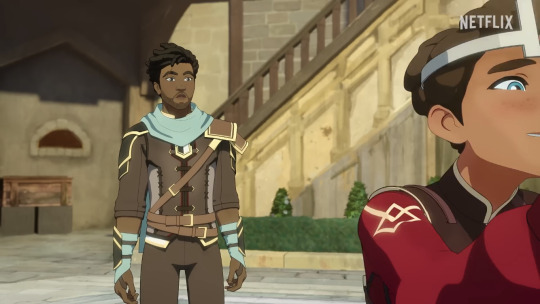



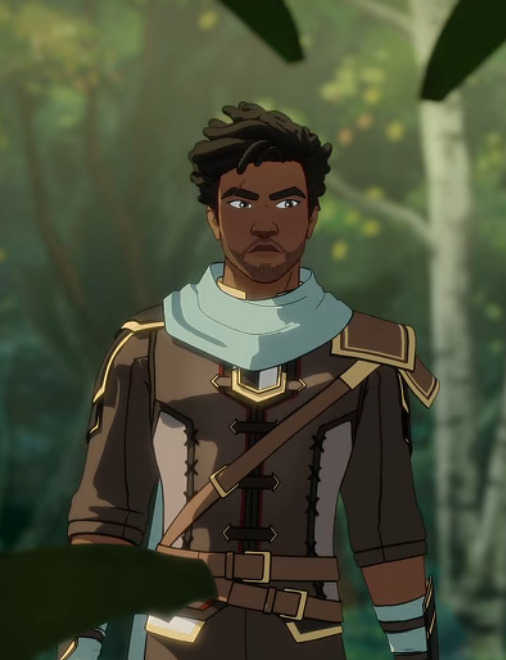

#like clearly soren subtly wants kids but is terrified of the idea because ✨trauma✨ but there isnt a bone of hesitation for corvus#and the way he reacted to terry talking about the two chicks like….someone get that man a baby to raise#jelly tarts#tdp spoilers#the dragon prince#tdp corvus#tdp s7 spoilers#Corvus: I want a baby.#Soren terrified out of his mind at the idea of making his parents mistakes:…like to hang out with?
137 notes
·
View notes
Text
Thoughts on 11x06
I had to come back to type this after the episode. I was gonna wait to post until more people are active but everyone’s safety is more important than notes. This was really hard for me to watch. It took me two hours because I kept needing a break. It’s a tough one yall. It’s heartbreaking and really brought out issues I didn’t know I was still dealing with until I reacted so badly to some stuff. Take care of yourselves and I’m here if you need to talk. I’ll have timestamps for major tws in another post coming right after this. I just gotta go back and get the end of those scenes. I only go the time they started.
Okay. So. There’s some trigger warnings that I’ve reblogged earlier. This recap WILL have thoughts about those triggers. If you think you’ll be triggered just message me or send me an ask and I’ll give you the non triggering recap. Stay safe please.
Kev and v intro. They’re having sex behind the bar
I’m extremely nervous for some reason I might not be able to get through this
Bike heist!!
LICKEY RIGHTS
LIP CALLS HIM MICK
MISSION IMPISSIBLE
Mickey is unimpressed
Lip telling Mickey what to do yes please
Fucking Mickey omg
HE LOOKS SO GOOD
THE WAY HE SAYS BRAD
Again Mickey is unimpressed
Lip :(
MICKEY CONCERNED ABOUT LIPS SOBRIETY
AGAIN I SAY LICKEY RIGHTS
Frank is falling the chick he’s boning Monica
Not sure that’s her real name
Wait yeah it is
Frank??? Has to get to work???
Wait her name isn’t Monica
Oh shut now I get what’s happening
“Can I speak to Pope Francis please” LIAM 😭
Poor baby
Lip cooking breakfast. Hot.
I forgot about camis baby
I actually beep bad for lip and Tami
We already heard this argument with Mickey and Ian get new material writers
PRODIGAL THEIF
PINK BOX HES SO CUTE
HE LOOKS SO CUTE GOTTA SQUEEZE HIM PLS
Yeah don’t tell Carl that traitor
MICKEY BROUGHT DONUTS PLS
HES SO CUTE
ITS TOO MUCH
I LOVE HIM
HIS SMILE!!!!!!!!
GALLAGHER YOUTH
THAT MEANS MICKEY TOO BYE
CARL CALLING HIM MICK TOO PLS
I CANT TAKE IT
Poor Liam he’s terrified
“I was hoping the fucker would just die” :(
Shut up Debbie
Mickey is beautiful
Leave Mickey out of it debbie goddamn
I cant fucking stand her
Frank just observing his kids and smiling
Same frank
SHUT UP DEBBIE
OH MY GOD HIS LAUGH IS THIS WHAT YOU HEAR WHEN YOU FIRST GET TO HEAVEN????
“And the smartest” lol
Someone save Liam
“I want Sandy”
We all do kid
Fucking manipulative little I CANT STAND DEBBIE
Sandy deserves better
I hate the Milkovichs!!!!
How did smart sensitive sweet beautiful loving Mickey come from this disgusting family????
MICKEY IS THE BOSS
My heart hurts so him
“Homo sexy” dear god
Mickey is too good he deserves so much better
I love him so much
Let him be happy
Mickey has the biggest heart
They’re actually talking and not fighting
CHAPO STFU
You’re so funny and smart and beautiful don’t forget that baby
SUGAR TITS
And no one is fazed lmao
“He’s actually my uncle and my dad” I fucking hate this show
I forgot Carl makes legit money now
Wtf kinda school is this
This is so fucked up
The twins are so adorable
SHUT UP DEBBIE
“You guys” I hate that but also she’s acknowledging Mickey as “hers” and he’s family :(
Okay this horrifying comment
I hate that it’s just nonchalant
Debbie just keeps talking.
Let’s move on
Mickeys face when she says “butt naked”lmao
LIP CALLING HIM MICK AGAIN
“Talk to you for a minute?”
“Yes. Please”
I LOVE IT
Mickey is unimpressed by lip once again and I’m smiling
They love each other they’re secretly best friends ITS A FACT
HAND SHAKE SO CUTE
MY BABIES
“Blue like my balls” fucking frank lol
They’re going in on Frank’s storyline now
Boss Mickey at it again
Terry’s home
The way his face falls im sick
SANDY BABY
My heart is racing
Mickeys face is breaking my heart
Great now I’m crying
Mickey got emotional
Ian sensed it and touched his neck all fucking sweet
Okay I had to take a little break because I started crying
I love him too much
Fucking Noel is so damn good
My heart is fucking breaking
“Frank’s not a homophobic psychopath who tortured you for years”
Please Mickey deserves better
I don’t wanna hear any Ian slander either.
In this house we protect my son and my son in law I will fight you
“Let’s get the fuck outta here. Lip you coming?” 😭
That was so hard to watch yall. I’m not gonna lie to you. My parents weren’t half as shitty as terry but growing up feeling unloved your whole life fucks you up anyway and that brought out some emotions and feelings I didn’t realize I still dealt with. I had to pause for a good while and cry.
Leave Sandy alone debbie
Terry is disgusting
Okay the homophobic language he uses is definitely triggering so I’ll time stamp that too
Debbie you selfish bitch
Everyone leaving terry outside it’s a yes from me
I honestly can’t concentrate on the other scenes now I’m sorry y’all
I try to cover everyone’s scenes but it’s hard for me today
I’m not okay
Liam is too innocent poor kid
MICKEY LIP AND IAN THE BEST TRIO
We need more scenes
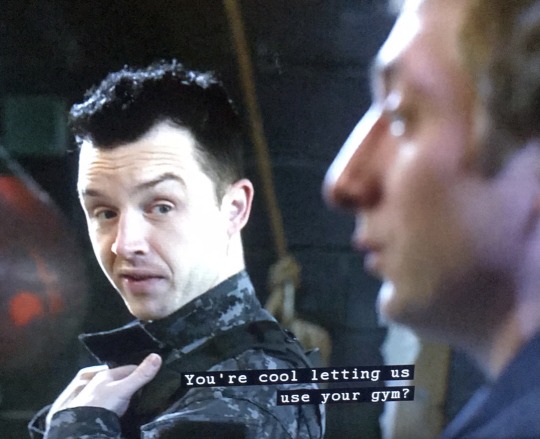
I PAUSED TO TYPE AND THE FUCKING LOOK HES GIVING HIM STOP
They’re besties
Mickey is beautiful
MY BABY BUSINESS BOSS MAN I LOVE YOU
he really hasn’t called him Philip the entire episode wtf
Ignoring Debbie
Now I want fries
Carl is cringy
Mickey drove them home and pulled a gun
Honestly again another heartbreaking scene
Ian’s trying to make him stop
Terry is disgusting and also a coward but we’ve been knew
Noel is the most amazing
Mickey gets teary but doesn’t cry bc I cried enough for the both of us
He’s the strongest bravest ever and I’m so proud of him
I need a hug
My heart hurts so much y’all
I just want him to be happy
I’m a fucking mess
I can’t handle Lip being emotional too
Oh I thought lip wanted to sell the house for himself only but at least they all get their share
Horrible music choice
I wanna tuck Mickey in with his favorite tv show on(911) make him his favorite food to eat in bed and not let anyone but Ian around him for a good 72 hours
The way Ian is looking at him
“Would you take care of me if I was paralyzed?”
“....yeah. Yeah”
“Top you whenever I wanted” “asshole”
His smile is back that’s all I need in life
MICKEY IS TOO GOOD FOR THIS WORLD
RIP DOWN THAT FLAG YES BABY
“That was big of you” “he’s an asshole...I wanna be better than that”
WHEN I TELL YALL I LOST IT I MEAN FULL ON SOBBING
YOURE ALREADY A THOUSAND TIMES BETTER THAN THAT PIECE OF SHIT
YOURE SO KIND AND BRAVE AND BEAUTIFUL INSIDE AND OUT
Ian’s like “back of the head? Gotta grab and hold my boy”
“You are so much better than that” IAN MY SWEET SON IN LAW I LOVE YOU THANK YOU FOR LOVING OUR BOY SO WELL
IAN IS THE MOST SUPPORTIVE HUSBAND
V spitting truth
I want terry to fucking suffer
Don’t do it frank
“Nah” LMAO
Frank loves his son in law
Sandy I love you
I need to hold her
No debbie I LOVE HER
NO SANDY LOVE ME INSTEAD
DEBBIE DOESNT DESERVE YOU
Carl scene was so awful I feel so bad for him this girl is a fucking psycho
That was an actual rape scene what the fuck
Mickey making frank laugh
Debbie explaining? Really?
I hate her
“How long is this gonna take? I’m fucking starving Lip” WHY WONT YOU CALL HIM PHILIP
“We could get on with our lives” well that hurt more than it should’ve
It’s really the end soon huh? 😢
According to captions Ian says “we’re in”
Frank reads his diagnosis
Carl goes to report his rape
That took me nearly two hours to watch. Yeah I usually pause to type but I had to take long breaks after the hard scenes. It was a really hard episode to watch. A lot darker than it has been. I’m not really okay right now. It was emotional but a really good episode overall.
#tw: r*pe#tw: homophobia#tw: inc*st#weekly recap#weekly thoughts#mickey milkovich#ian gallagher#gallavich#shameless#shameless us#noel fisher#cameron monaghan#mickey gallagher#frank gallagher#lip gallagher#sandy milkovich#terry milkovich#liam gallagher#carl gallagher#Debbie Gallagher#shameless final season#shameless s11 ep6#11x06#shameless 11x06
58 notes
·
View notes
Text
Looking Back at the Legacy of 'The Great White Hope' and Boxer Jack Johnson
https://sciencespies.com/history/looking-back-at-the-legacy-of-the-great-white-hope-and-boxer-jack-johnson/
Looking Back at the Legacy of 'The Great White Hope' and Boxer Jack Johnson

SMITHSONIANMAG.COM | Feb. 25, 2021, 8 a.m.
“There’s nothing you need to make up about Jack Johnson.”
Documentarian Ken Burns would know. His 2005 series “Unforgivable Blackness,” based on the book of the same name by historian Geoffrey C. Ward, brought the true story of the life and career of Jack Johnson, the black boxer who fought his way up through the pugilism ranks to become the world heavyweight champion, to television.
But before Burns, those who weren’t around for the so-called “Fight of the Century” that saw Johnson outslug James J. Jeffries in 1910, would have known Jackson’s story through the play and movie The Great White Hope. That work of historical fiction, by playwright Howard Sackler, perhaps reveals more about the time in which it was written than the time in which it is set.
The play’s message about the nature of racism and racial conflict succeeded in providing audiences with an opportunity to better understand different perspectives through the prism of its characters, but the film adaptation failed to deliver the same powerhouse impact. That said, both served to launch the careers of two actors on the rise and brought to the public a poignant story of interracial romance and the struggle for interracial couples to find acceptance in America.

Alexander and Jones in a publicity still from the 1970 film
(Photo by Afro American Newspapers / Gado / Getty Images)
Sackler’s much-lauded play arrived in 1967, as the civil rights movement’s struggles were at last bearing fruit. In The Great White Hope, black boxer Jack Jefferson—a name change borne out of legal concerns—becomes so successful that a fight is set up between Jefferson and the reigning heavyweight champion of the world, a white man. In addition to developing a story which focused on an equivalent of the Johnson-Jeffries fight, Sackler constructed a storyline based on the relationship between Johnson and his first wife, a white woman named, Etta Terry Duryea, represented in the play by the character of Eleanor Bachman. In addition to mirroring the tensions Johnson and Duryea endured in pursuing an interracial relationship during the early 20th century, Eleanor’s ultimate fate mirrors that of Duryea, who died by suicide in 1912.
The play’s title came from the descriptor assigned decades earlier to any white boxer who stepped into the ring to challenge Johnson, although it was most famously used to describe Jeffries, who had retired from the ring more than five years before the landmark fight. Upon being wooed into returning to the ring, Jeffries made his reasons perfectly clear, publicly announcing, “I am going into this fight for the sole purpose of proving that a white man is better than a Negro.”
As history reveals, Jeffries proved no such thing: not only did Johnson win the fight by a technical knockout in round 15, but as fellow boxer John L. Sullivan told the New York Times, “Scarcely has there ever been a championship contest that was so one-sided.”
youtube
Sackler drew inspiration from these events, seeing in Johnson an opportunity to tell a story about a man who becomes a hero but is nonetheless destined for a downfall, someone who many—including the play’s director, Ed Sherin—likened to the titular character in William Shakespeare’s Coriolanus. “It’s about a man who essentially moves out of his tribe and gets clobbered,” Sherin told The American Theatre in 2000. “And in [Sackler’s] mind, it wasn’t about black-white. The historical circumstances made that the paramount issue in the play. But it’s not. And it taps off white guilt about the way the black man was dealt with, but that was not [Sackkler’s] position at all. He wrote a play about a tragic hero, somebody who oversteps himself—as Coriolanus did.”
***********
The Great White Hope began with a grant from the National Endowment for the Arts to Arena Stage, a Washington, D.C. theater, which at the time was best known for being the first integrated theater in the city. To find the right man for Jefferson, Sackler reached out to actor James Earl Jones, an established performer was working in Europe.
“Howard suggested that I start getting into shape, which was really important—the man was a boxer—but which I was not and am not and will never be!” says Jones, laughing. “In fact, the young man who was my understudy onstage, Yaphet Kotto, resembled Jack much more than I did.”

James Earl Jones looks at his reflection in a Broadway dressing room mirror on December 10, 1968.
(Photo by Harry Benson / Daily Express / Getty Images)
For the role of Bachman, Sherin went with an existing member of the Arena Stage company: actress Jane Alexander, who would later become Sherin’s wife. Despite the racially charged subject matter, Alexander had no hesitation about diving headlong into the material.
“I really looked forward to doing things like that,” says Alexander. “Of course, civil rights were very high at that time in the ’60s, and we did not shy away from controversy at Arena Stage. We did quite a lot of things, tackling the Vietnam War and racism and so on, so I didn’t have any problem with the subject matter.”
Alexander also politely disagrees with her co-star’s self-assessment. “[James] is a big man—he certainly looks like a heavyweight champion!—and he got in such great shape,” she says. “He was just gorgeous-looking at the time. But he was formidable…and when he gets that look in his eyes, he’s scary!“
The Great White Hope only played for a few weeks at Arena before its success catapulted it to Broadway. Although the audiences were initially almost entirely white, Alexander says that the number of black theatergoers began to increase steadily as the play received more acclaim, hitting the 50/50 mark by the end of the first year. As a result, she also began to notice that black audiences reacted differently to the play than white audiences.
“They didn’t like my character at all…and who could blame them?” concedes Alexander. “I was causing him all these problems! So they would sometimes cheer or laugh at my death…and that was not easy for James Earl, because [he] looked at it as a love story. He had a very difficult scene to perform over my dead body, and they were sometimes not happy with him being emotional about me.”
Even worse, Alexander also began receiving hate mail. “Sometimes they were just disgusting letters from white bigots, male and female. Really awful letters. But I got a couple of death threats. That’s when I said to my stage manager, ‘I can’t open my mail.’”
Jones, for the record, didn’t receive any such threats, but the fact that his co-star did receive them, he says, “sort of measured the height of the bull****.”
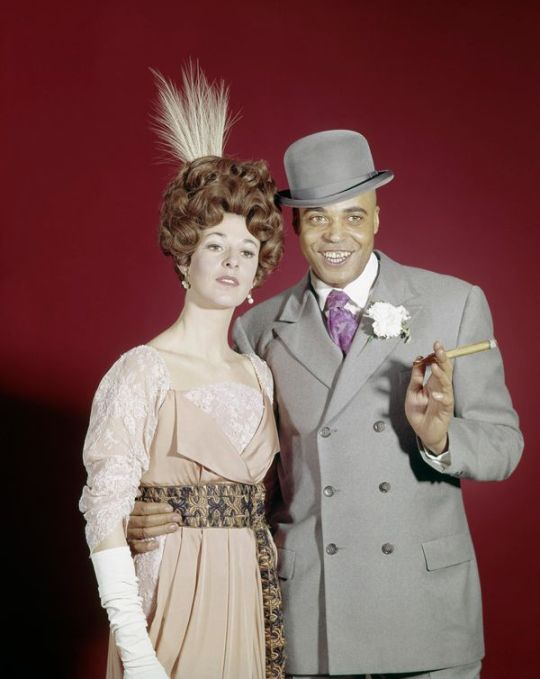
Both Alexander and Jones received Tony Awards for their work in The Great White Hope.
(Photo by NBCU Photo Bank / NBC Universal via Getty Images)

Muhammad Ali at a November 12, 1968, performance of The Great White Hope on Broadway
(Photo by Tom Wargacki / WireImage)
Fortunately, those who appreciated The Great White Hope far outweighed those who didn’t, and one of the play’s biggest fans was one of the most famous men in the world: Muhammad Ali, who understandably saw some parallels between himself and Jones’s character. (“What Ali actually said was, ‘This is my play, except for the white chick,’” recalls Alexander, laughing.)
“Muhammad Ali had just done a Broadway play himself—or, rather, a musical—called Buck White, where he played kind of an activist,” recalls Jones. “He considered himself a stage actor, I think, so he’d come back and wanted to talk actor to actor about my work. When the audience left the theater, he used to love going up on the stage and say, ‘Watch this!’ And he’d take a crack at a scene, and then he’d say, ‘And that’s the way that ought to be done!’ I loved it. And the way he’d interpret it? He wasn’t always wrong!���
Ali was also responsible for one of Alexander’s most cherished memories from the Broadway run of The Great White Hope, during the third of his backstage visits.
While the film version of The Great White Hope received its fair share of critical acclaim, with both Jones and Alexander—in her film debut—earning Oscar nominations for their work, few would disagree that it’s a lesser work than the play. The first sign that Hollywood had done some major streamlining: the play originally ran for three-and-a-half hours, whereas the film version clocks in at a streamlined 103 minutes.
“I missed some of the lyricism in the beautiful long monologues—or soliloquies, if you will—that some of the actors had, specifically [James],” says Alexander. “They were cut, a lot of them. “
Jones pulls no punches when offering his take on the play’s cinematic adaptation. “I apologize for the film, because it wasn’t right,” he says. “The big mistake happened when the decision was made not to have Ed Sherin direct the film. It was a big investment on the part of 20th Century Fox, and they made an attempt to work around the cost of filmmaking. They decided to make it… I wouldn’t say ‘cheap,’ but they thought they couldn’t afford to take a gamble on [a first-time film director].”
“They made a decision to shorten it by using a formula which… Well, I won’t try to define it, but they wanted to make it a romance,” says Jones. “Which it was in real life, but it was a mistake to try and ignore all the dynamic stuff going on in that man’s life in favor of trying to make it a love story of this poor black guy and this poor white girl who wanted to be together in life. But America just didn’t let them do it.”
Jones’s description of the film’s romantic plotline is dripping with sardonic wit, something which becomes evident when he abruptly begins chuckling.
“The truth is, I think Ken Burns’ documentary is more important than the film or the play we did,” says Jones. “I thought there was no way you could capture all the dynamics of that man’s life, all the gorgeousness and physical beauty, the human beauty of the man called Jack Johnson. But Burns captured it. Whether you’re a boxing fan or not, whether you have any corner of the race issue you want to explore, it’s something everybody should see.”
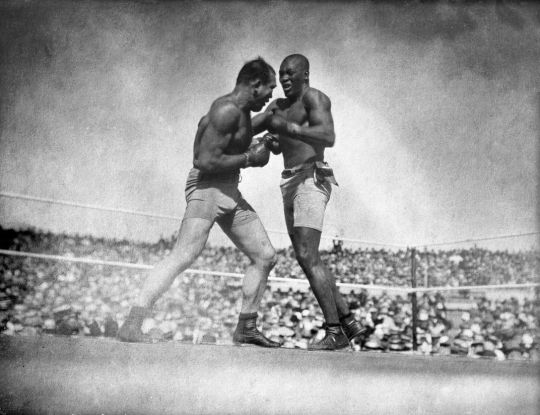
Jack Johnson (right) defeated Jim Jeffries in a 1910 boxing showdown.
(Photo by PA Images via Getty Images)
“He stuck around late enough that the stage manager had already put the ghost light onstage. Only the doorman was left, and I was in the wings. And Muhammad Ali walked out in that dark theater and turned to a naked, empty house, and he reprised the last line of the second act: ‘I is here! I is here! I is here!’ It was amazing. And nobody ever witnessed that but me. “
**********
The success of The Great White Hope soon led to conversations about adapting the play into a film, but those conversations didn’t include Alexander until after the show swept the Tony Awards, winning Best Play and earning Jones and Alexander trophies for their roles, too. The acclaim even extended beyond the traditional theater community, with the play winning the Pulitzer Prize for Drama as well.
“I was told that [film director] Martin Ritt offered it first to Joanne Woodward,” says Alexander. “She turned it down, saying, ‘You should get that girl who did it on Broadway.’ And then he went to Faye Dunaway, and Faye turned it down! And then what happened after Faye turned it down? The Tony Awards happened. And the next day, I got the offer.”
youtube
Burns, who interviewed Jones for “Unforgivable Blackness,” believes the problem with the film adaptation extends well beyond trying to force it into being a love story.
“The much more important thing is something that you find throughout well-intentioned history and art about African-Americans, which is that somehow they always need to have a white person around to justify them,” says Burns. “In The Great White Hope, here’s this incredibly talented physical specimen who plays in all these incredibly dangerous tropes about black people, and yet somehow you need well-intentioned white handlers in whatever form—romantically or fight-wise—to sort of nudge you to the right direction, as if they’re unaccompanied minors who need to be accompanied.
Adds Burns about the real story he found while making the documentary, “What’s so important about Jack Johnson is that he defies all conventions we want a heroic black man to be in. He doesn’t want the job of hero. Somehow we want our African Americans to conform to some version of our idea of an acceptable black person. Jack Johnson just takes dynamite and pushes the plunger on that.”
“I admire the play, and I admire the movie, and it’s heart is in the right place, and it’s intentions are good, but it’s in a narrow bandwidth that doesn’t permit the full scope of Jack Johnson, good, bad, and otherwise,” concludes Burns. “It constrains him with narrative devices that aren’t needed.”
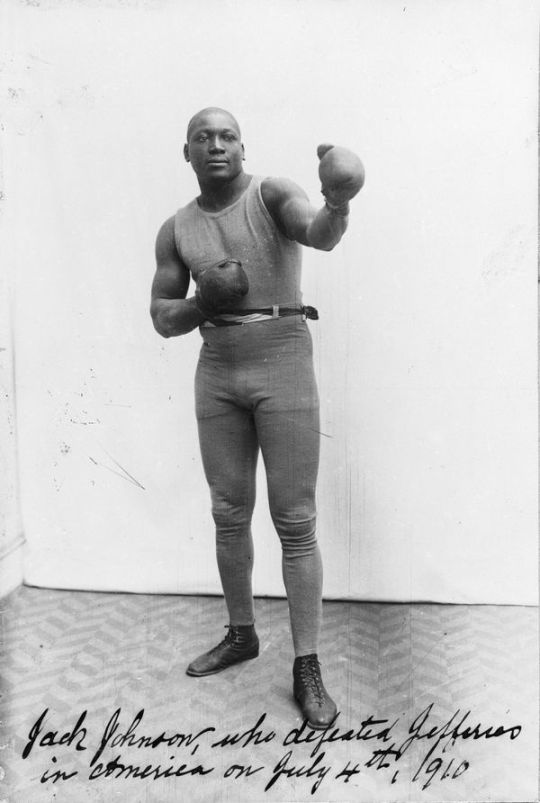
Boxer Jack Johnson
(Photo by Sean Sexton / Getty Images)

Jones in boxing attire
(Bettman via Getty Images)
Even with its flaws, there’s no question that The Great White Hope made an impact on those who saw it, on stage or screen.
“I remember walking down the streets of New York for the next decade, and black men would just come up and say, ‘Hey, Jane, how are ya?’ or something like that,” says Alexander. “I remember once I was in an airport, and Snoop Dogg yells across the terminal, ‘Jane!’ I recognized that he was a big music star, but I didn’t know who it was, so I just sort of inched over a little bit…and he just said, ‘Hey!’ That’s all! But I felt very warm inside that black men recognized me, seemed understanding and supportive, and… I think they were saying that they knew that it was a difficult role.
“It was surprising to me the number of white people who wondered why I had done the film. There were a lot of firsts there. The racism was not as overt as it is today, but it was there, and I was surprised it was there in my parents’ friends, who would just question me and say, ‘Why did you have to do that for your first film?’ I was thrilled! Race relations were different at that time. We didn’t march in the same way. If you look at the marches in Selma, Alabama, you won’t see a lot of white people. But I was part of the Poor People’s March in Washington (in 1968), and I went and listened to Martin Luther King speak. But now we have Black Lives Matter, and there are a lot of white people and black people walking side by side. That’s progress.”
#History
2 notes
·
View notes